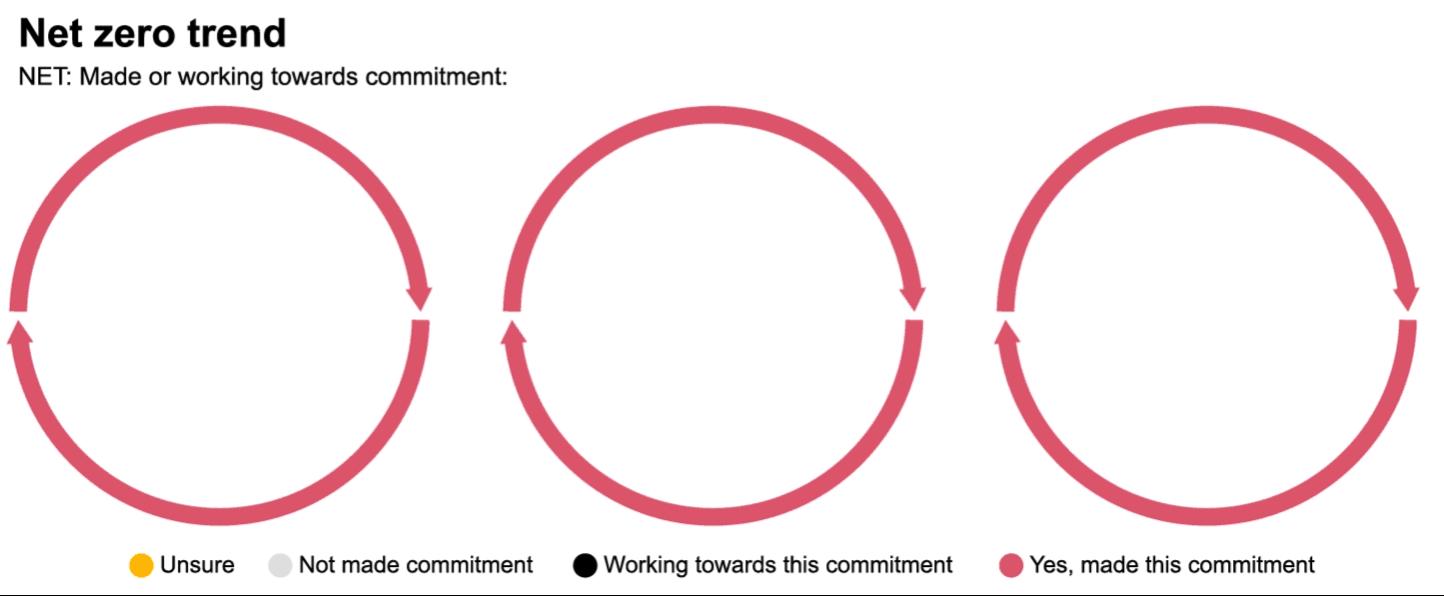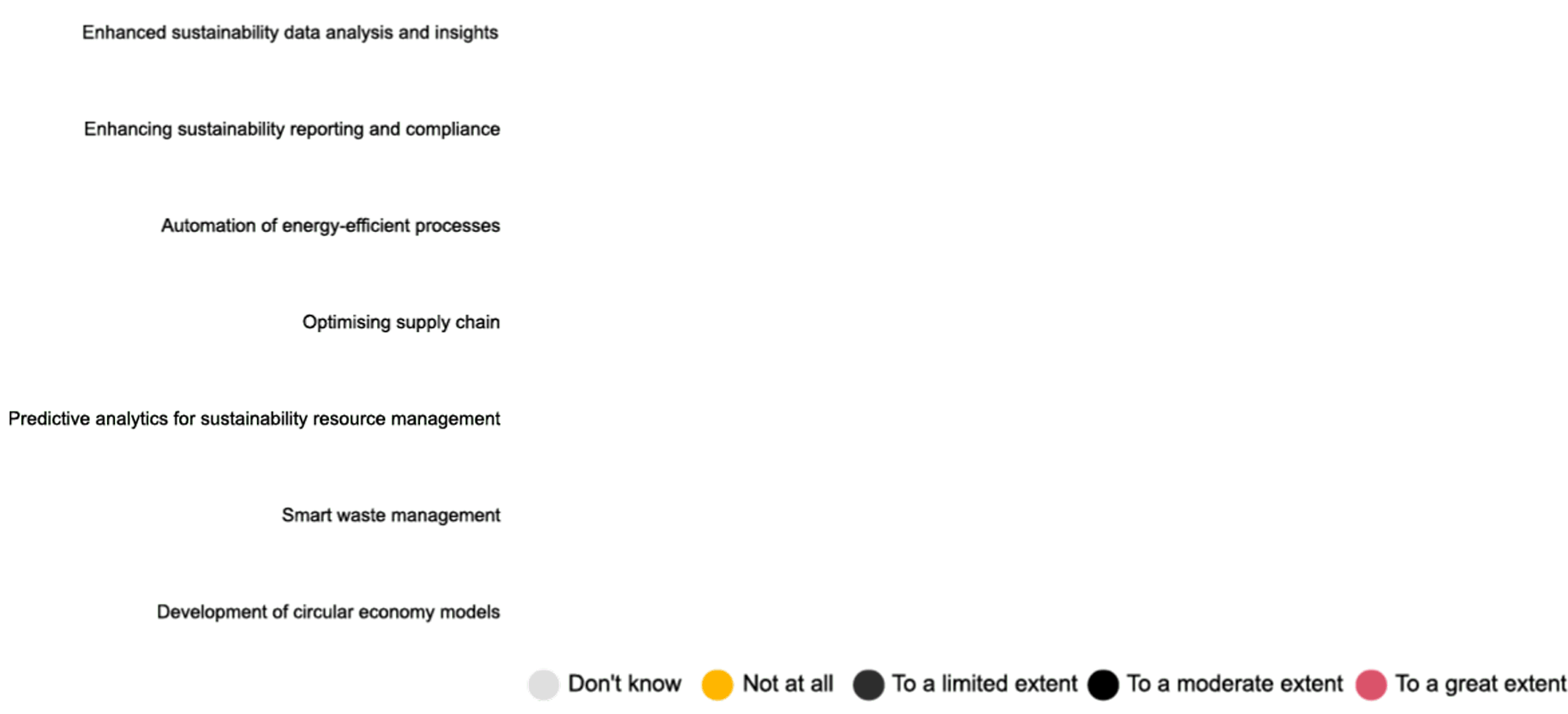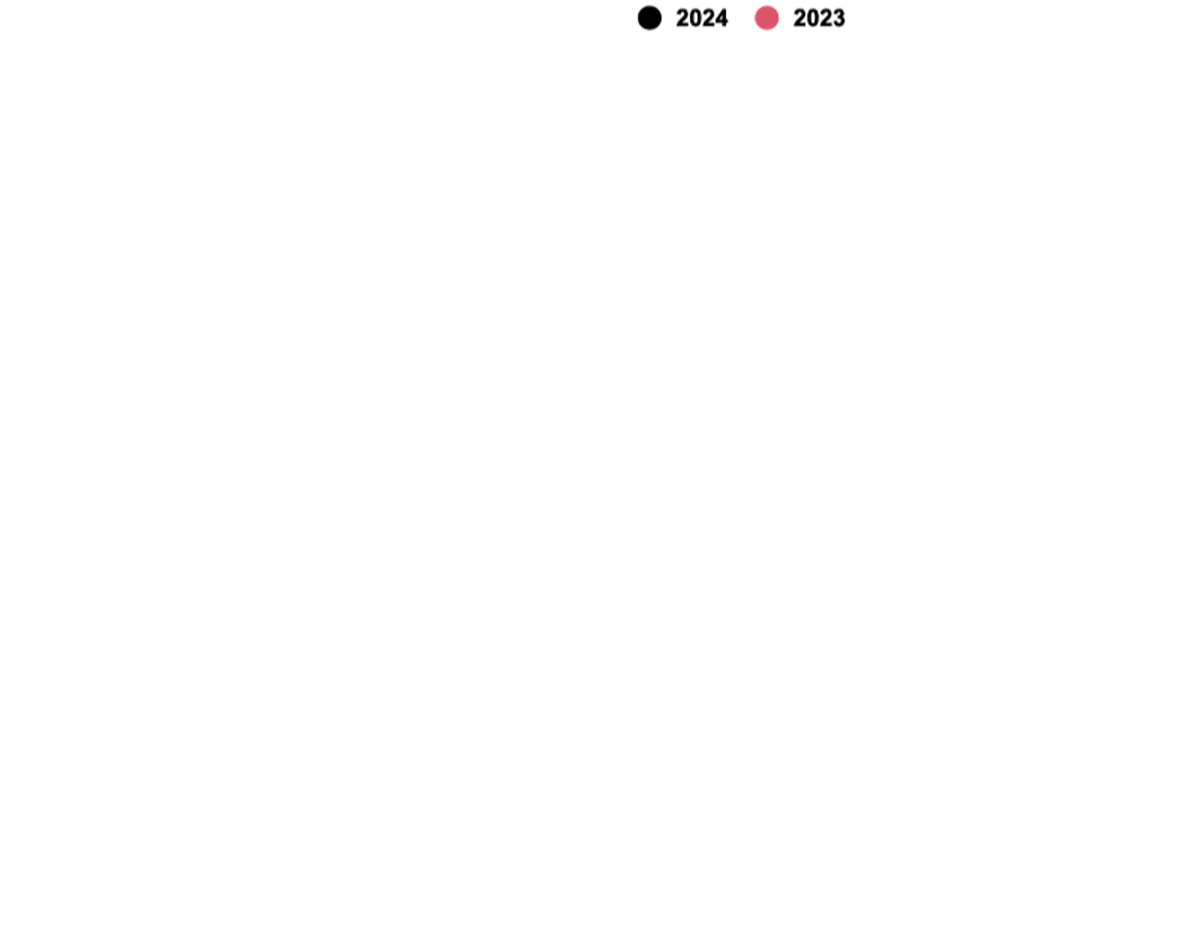
Sustainability in the Middle East 2024 intro
ــــ
Eight in 10
have a formal sustainability strategy (up from 64% in 2023)
ــــ
>50%
have fully embedded their sustainability strategy across their organisation
ــــ
One in two
now have a Chief Sustainability Officer or plan to appoint one in the next 12 months
ــــ
One in three
say a lack of internal skills and sustainability expertise remains the biggest challenge
ــــ
2.5X
companies plan to access green loans and bonds-up 20% since 2023
Foreword
In a year marked by significant climate progress across our region, including landmark climate actions and initiatives at COP28, we have seen an increasing commitment among businesses and political leaders to tackle the climate crisis, adopt circular economy principles, and harness the region’s competitive advantage around renewable energy.
Our survey, 'Sustainability in the Middle East 2024: Breaking through barriers', indicates growing momentum on the sustainability agenda. Business leaders are increasingly embedding sustainability principles and making structural changes to act on them. A growing roster of companies now have a Chief Sustainability Officer or senior executive just below C-suite dedicated to advancing their sustainability agenda.
Finance has also seen a breakthrough: companies report that they are increasingly able to access green bank loans and green bonds instead of just self-funding sustainability initiatives. However, the need for new talent and workforce skills remains a significant issue. Ensuring the workforce can effectively implement sustainability actions is one of the biggest challenges facing our leaders.
Looking ahead, the government and private sector must continue prioritising responsible investments and explore forward-thinking ways to leverage technology, such as GenAI. And business leaders need to be convinced that sustainability actions can not only generate a return on investment but also accelerate profit. Companies that prioritise sustainability are often more profitable, as climate-conscious consumers prefer brands that commit to environmental responsibility. Additionally, businesses that take climate risks seriously and future-proof their operations and supply chains are likely to perform better in the long run.
Sustainability is a journey. Creating positive, enduring change requires timely actions, building the right capabilities, and developing infrastructure and legislation to provide the framework to further enable progress.
Dr. Yahya Anouti
Partner, Strategy&
PwC Middle East Sustainability Leader
Sustainability takes centre stage in company strategy
The calls to accelerate collective climate action during COP28 last year have thrown a spotlight on climate change as a key business and societal challenge. This, in turn, is inspiring companies to set ambitious new goals for climate action. Key findings from our latest sustainability survey show that companies in the region are making sustainability a focal point of their corporate strategic agenda. Better sustainability monitoring and reporting, and stronger commitments to a net zero future than last year should help drive measurable progress on reducing carbon emissions.
Four in five executives in our survey indicate that their companies now have a formal sustainability strategy in place – and more than half say this strategy is fully embedded across their organisation (Figure 1). This marks a positive shift, as leadership support for sustainability was previously less established, with boards and C-suites less engaged. This year, the share of respondents citing a lack of leadership buy-in has dropped by almost half, to just 16%.
The survey underscores findings from our 27th Annual CEO survey: Middle East findings, which showed that regional leaders are determined to address climate change, and emphasised the need for businesses to take action in order to help achieve the region's ambitious climate goals. Slightly more regional CEOs identified climate change as a major concern compared to the global average (15% vs. 12%) and were more likely to see it as a key driver for corporate change in the next three years (36% vs. 30%).
Figure 1: Sustainability has become a strategic priority for Middle East businesses
Q. Which of the following best describes your organisation’s Sustainability/ESG strategy status?

This indicates a clear connection between the growing commitment of regional business leaders to sustainability and the increasing formalisation and embedding of sustainability strategies within companies.
Another indicator of the growing sustainability momentum in Middle East businesses is the widespread adoption of net-zero greenhouse gas emission targets. These targets are central to mitigate climate change. Our survey reveals that the share of companies in the region that have made a net-zero commitment has risen sharply to half of all respondents, with an additional 26% working toward making such a commitment (Figure 2).
While the data may not be representative of the entire region, the trend is directionally clear. The roster of Middle Eastern companies publicising net-zero commitments is expanding across all sectors, to include airlines such as Etihad, oil and gas companies including Aramco and ADNOC, other energy and utilities firms such as Saudi’s Acwa Power and stc Group, logistics groups such as Kuwait’s Agility, and consumer companies like Majid Al Futtaim, who operate across the Middle East, Africa and Asia.
"COP was not just an event, and it definitely did leave an impact. We see there is more drive towards promoting sustainable thinking and implementing it. There’s more awareness."
Figure 2: Half of the survey respondents have made a net-zero commitment
Q. Has your company made a commitment to a net zero target?

Base: All respondents (2024 - 58), (2023 - 56), (2022 - 67)
Sustainability rises to the C-suite
With businesses in the region rethinking their strategies for sustainability - reducing carbon emissions, enhancing sustainability reporting and transparency, and adapting to climatic risks - we see a clear change in direction with significant operational adjustments as sustainability is increasingly integrated into organisational structures.
There are important organisational implications: the survey highlights the growing trend of companies creating top-level positions, such as chief sustainability officer (CSO) or sustainability director roles just below the C-suite. Almost half of respondents say their companies either have a CSO or plan to appoint one in the next 12 months (Figure 3). Additionally, chief executive officers continue to lead sustainability efforts in about one in six companies.
Figure 3: The role of Chief Sustainability Officer is on the rise in the Middle East
Q. Do you have a Chief Sustainability Officer within your organisation?

For those taking on these roles, their job description has become more critical and ever clearer as they aim to integrate sustainability into the heart of their businesses.
For 90% of our survey respondents, these new leadership roles involve both setting sustainability strategy and policy, and overseeing monitoring and reporting. For this year’s survey, in the question about the remit of these roles we provided a choice of 10 areas of sustainability-related activity - from stakeholder management to communication and marketing (Figure 4). Almost 80% of respondents indicated that their sustainability role covered seven or more of the 10 activities listed, and nearly 20% said their role covered all of them.
Moreover, carbon reporting is one aspect of broader sustainability reporting in a growing number of businesses. Some are also tracking metrics beyond carbon, such as biodiversity impact, to broaden their view of climate footprint. In Qatar, companies are focusing on water as a critical resource.
Figure 4: Setting sustainability strategy and overseeing reporting are key functions
Q. Which of the following activities fall under the person responsible for leading and delivering Sustainability/ESG objectives and initiatives in your organisation?

The survey also reiterated the growing importance of sustainability reporting, driven by increasing demands for transparency from regulators and investors both regionally and globally. This was echoed in our 2023 Global Investor Survey, where we found significant investor scepticism around sustainability reporting in the Middle East, with 95% of those who invest or cover companies in the Middle East indicating that they believe corporate reporting on sustainability performance in the region contains some level of unsupported claims.
While sustainability reporting by public companies in the Middle East remains largely voluntary, unlike the mandatory requirements in the EU and US, an increasing number of regional businesses are now publishing sustainability reports. Of those surveyed, 66% that produce reports adhere to the Global Reporting Initiative (GRI) framework.
In 2022, our Middle East ESG survey had revealed that only 26% respondents believed “Transparency and Reporting” to be a top priority, however over 75% of the respondents expected the ESG regulations and reporting requirements to get more stringent.
In 2024 just over 40% of our survey respondents said their companies produce full reports, while a further 24% disclose selected sustainability or ESG metrics (Figure 5). This underscores that organisations now recognise the importance of transparency and building trust, as well as improving performance and creating value for their people and the planet.
However the gap still exists between the current focus on reporting and expected evolution of reporting requirements. Key challenges, such as a shortage of qualified staff and the use of different reporting standards across the region, continue to hinder progress in achieving this objective. Half of those who do produce reports selected one to two reporting standards, while a quarter (24%) chose between six to eight. Such inconsistency can potentially create reporting complexities for companies across the region.
Executives in follow-up interviews to the survey felt that governments in the Middle East could do more to streamline reporting standards in the region.
"A lack of alignment remains one of the main challenges for progress on sustainability around the world. For example, there are over 40 taxonomies globally and more on the way. Having a strategic direction and overall framework that connects all the dots will present better value for the road ahead."
Figure 5: Two-thirds of companies in the Middle East now produce sustainability reports or key metrics, our survey shows
Q. Which of the following describes your organisation’s current approach to Sustainability/ESG reporting?

Creating a talent pipeline for the future
One of the challenges for companies as they bolster their sustainability reporting is finding the talent that understands the issues well enough to satisfy regulators. When asked to identify the core competencies critical for further progress, nearly 80% of survey respondents pointed to knowledge of sustainability reporting and regulation requirements and frameworks.
This is just one facet of a broader challenge in the region: bridging the talent gap across all aspects of sustainability. Several prior reports and surveys have emphasised the region’s need for critical skills if it is to succeed with its plans to decarbonise and reach net zero targets. For example, findings from the PwC Middle East Workforce Hopes and Fears Survey 2023 revealed the importance of green skills in the region, with 62% of respondents surveyed anticipating a significant demand for these skills.
Our latest sustainability survey shows that there is an opportunity to raise skill levels and employ a wide range of talent that will be critical to the progression and implementation of sustainability strategies across the region’s public and private sectors. (Figure 6).
Several approaches can help companies build their talent pool. Hiring or contracting, including from overseas, is one obvious path. However, there is considerable room for in-house training, to ensure companies have the skills they will need in the future.
Figure 6: A wide range of skills is needed to implement sustainability policy
Q. Which, if any, of the following areas of knowledge and expertise are critical to progressing and implementing your organisation's Sustainability/ESG strategy?
(Ranked in top three responses)

Skills are an essential element not only for sustainability but also for technology adoption, especially technology that can help propel a sustainability agenda. To that end, the survey asked how companies are viewing GenerativeAI (GenAI) as a tool to enhance their ability to create, implement and monitor sustainability over the next three years.
Worldwide, GenAI has emerged as a robust catalyst for innovation across companies and industries, boosting productivity and introducing large-scale efficiencies. However, responses to our survey suggest that, for many Middle East companies, these are still early days in AI deployment for truly enhancing sustainability. Respondents are looking at the technology mainly to enhance existing capabilities, such as data analysis and insights or reporting, rather than for deeper operational purposes, such as optimising supply chains or developing circular economy models (Figure 7).
This could change with upskilling, as the workforce gains more confidence around AI more broadly, and businesses become more comfortable with adoption. In fact, in the region, we are already seeing examples of organisations slowly adopting this emerging technology, such as agri-food tech player Cropin that recently launched Akṣara, the sector's first purpose-built open-source Micro Language Model for climate-smart agriculture. Featured in PwC’s Net Zero Future 50 Middle East report, Cropin's use of GenAI has the potential to transform agriculture, ushering in a new era of tech-driven farming. It will enable agricultural stakeholders, developers and researchers to tackle global challenges such as food security, climate change, resource conservation (water and soil), and regenerative agriculture practices by providing access to contextual, factual, and actionable information.
"Generic models when applied in agriculture often suffer from unconscious biases, lacking the diversity of data needed to be truly helpful and accurate. Akṣara empowers and equips farmers, agronomists, and agricultural scientists, with the critical knowledge and the tools they need to transition towards more sustainable practices."
This keenness of embracing GenAI has been reflected in our latest CEO survey, where almost three quarters of Middle East CEOs indicated that they expect GenAI to significantly change how their companies create, deliver and capture value over the next three years, while 38% revealed their companies already adopted GenAI.
"AI will be a big area of focus for us going ahead as we see it will improve environmental monitoring efficiency and quality of outcomes."
Figure 7: GenAI will offer further opportunities to drive the sustainability agenda
Q21. To what extent do you believe Generative AI will enhance your organisation's ability to create, implement and monitor Sustainability/ESG objectives and initiatives in the following areas within the next three years?

Tapping into new funding
One of the critical breakthroughs over the past year has been the opening of new sources of funding for sustainability efforts.
Respondents in this year’s survey are planning to access a greater variety of financing opportunities and mechanisms. While self-funding remains the most common green finance source for two-fifths of the survey respondents, it is more likely than last year to feature alongside other options, with 34% revealing that they would opt for green loans, and an equal number (33%) considering capital markets (for example, green or blue bonds) as part of their financing options (Figure 8).
These findings echo our other research suggesting that the green finance sector has shown rapid expansion in recent months. This includes a more than doubling in the issuance of green bonds and sukuk in the Middle East to $24bn in 2023, according to PwC’s latest Middle East Economy Watch.
Figure 8: Funding for sustainability actions has become more accessible
Q. Which, if any, of the following green finance options is your organisation planning to access over the next 12 months?

Base: All respondents 2024 (58), 2023 (56)
The diversification of green finance options not only supports a wider array of sustainable projects but also enhances the region’s ability to meet its ambitious climate targets, showing a strategic shift towards a more resilient economic model. Given its vulnerability to water scarcity and food security, promoting sustainable finance and fully integrating ESG factors into core financial strategies are crucial for the region to adapt to and mitigate the effects of climate change.
This urgency was amplified at COP28, with the United Arab Emirates (UAE) announcing the ALTÉRRA climate investment fund with a $30 billion commitment. The green financing trend will continue to strengthen in 2024, with Sharjah issuing a second sustainable bond, Oman publishing its Sustainable Finance Framework, and Qatar having launched its debut green bond in May this year. Saudi Arabia is also considering a sovereign green issuance and has launched a Green Financing Framework, indicating sustained growth in this sector across the region.
The private sector - a catalyst for action
The private sector can play a role in scaling the region’s sustainability commitment. Sustainability leaders have indicated that there is a clear appetite and opportunity for the private sector to push for further progress to support the region's sustainability agenda, pointing towards a clear pathway for creating transformative impact. Favoured actions from those we surveyed include forming more collaborative partnerships and alliances, developing talent to overcome the skills gap, and investing in sustainable projects (Figure 9).
Uncertainty around the return on investment
While half of the region’s sustainability leaders see cost savings as a key driver for adopting sustainability practices, one in five remains uncertain about the return on investment. This concern is also reflected in our 2024 CEO Survey: Middle East findings, where the majority of companies said the biggest challenge to decarbonise was inadequate returns on climate-friendly investments (30% regionally said this was a large or very large challenge vs 23% globally).
Along with most companies globally, only four in ten (or 37%) are willing to accept lower rates of return on climate-friendly investments.
"For us, the main issues are demonstrating a return on investment on social reporting, the lack of government support, and economic uncertainty".
However, we have seen that consumers are willing to pay a premium for sustainable products. This has been reflected in our 2023 Global Consumer Insights Pulse Survey where 70% of respondents said that they were willing to pay more for sustainably produced goods ‘to some or to a great extent.’ Consumers now understand the benefit of aligning their social concerns with purchasing practices, while companies, for their part, may be able to leverage some much-needed pricing power.
What’s more, organisations and brands are not only using sustainability as a market differentiator, but also to save on costs and accelerate profit. For example, the Dubai Electricity and Water Authority (DEWA) has tapped the power of sustainability to keep up with the surging demand of its utility services. DEWA’s shift to a greener style of operation has resulted in greater efficiencies of grids and generation units, significant emissions reductions and is part of its elaborate plan to slash the carbon footprint significantly. Globally, the multinational consumer goods company, Unilever has also leveraged sustainability for competitive advantage. Through its Sustainable Living Plan, the brand has set ambitious goals to reduce its environmental impact while also driving growth.
"Companies that align themselves with these trends of energy transition will find lots of opportunities, especially as regulation aligns and provides incentives or disincentives."
Figure 9: The private sector are driving more opportunities to continue the sustainability momentum
Q. In which of the following areas do you think the private sector can play a role as the region scales up its sustainability commitment?

Your next move
Moving forward, we see four clear areas of focus for sustainability leaders in the Middle East, to help accelerate sustainability progress on the region’s most critical climate issues and reduce the carbon footprint of their own organisations:
The primary message from this year’s ‘Sustainability in the Middle East 2024: Breaking through barriers’ is a dual faceted one - centred on the progress made and the progress still to come. Undoubtedly, barriers are breaking down as the region’s business leaders recognise the urgency of a robust sustainability agenda. The pressures on them are increasing, from regulators at home and overseas, and from society at large. Yet doubts remain, particularly concerning the potential costs of sustainable investments and the perceived low returns , which evidence suggests may be unfounded. All stakeholders have a role to play in ensuring that the focus on sustainability continues and intensifies, and that discussions about climate action translate into tangible actions.

About the survey
The third PwC Sustainability Middle East survey was conducted between April 1 and May 6 2024. Our survey gathered responses from leaders involved in sustainability activities within their organisation. Most participants were from organisations headquartered in the GCC region, and 64% have revenues exceeding $100 million. The largest number of respondents are from organisations based in the UAE (48%) followed by the Kingdom of Saudi Arabia (22%) and Qatar (14%). A mixture of C-suite and director-level executives participated, with 40% of responses from C-suite executives and 55% from director-level executives all with sustainability responsibility. Companies came from a range of sectors, namely financial services; industrial products; retail and consumer; energy, utility, and resources; technology, media, and telecommunications; health; and government and public services.
Partner and Sustainability Leader, Strategy& Middle East
Amal Larhlid
Partner, EMEA Government & Public Sector Sustainability Lead, PwC Middle East
Azzah Fawzi
Partner, Climate Risk and ESG Reporting Leader, PwC Middle East













